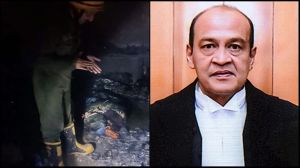Surface tension
Reena Mohan's documentary Skin Deep takes a good hard look at the image women see, reflected, when they stand in front of the mirror. qu...

Reena Mohan8217;s documentary Skin Deep takes a good hard look at the image women see, reflected, when they stand in front of the mirror. quot;Too thin, too fat, bad skin, bad hair! Oh God! How can I ever go out looking like this?quot; are thoughts which race through the minds of millions of women living in a consumerist society, today. Shot all over the country, the film contains interviews of various women talking about their looks 8212; a perception that forms the basis of their self-identity. While Mohan8217;s film gently takes the scab off the social myth of beauty, what comes to light is ugly and unnerving. A Tamilian woman, who is an actress and a playwright, has always been in the wings, literally, because of her dark skin.
She talks about a recent ad for a beauty soap where a teenage girl is teased by her friends for continuously saying, I Don8217;t Care8217;. The girl repeats her leitmotif when her friends taunt her about not doing well in her exams but when a pimple is pointed out, her face completely falls and she goesto her mother in distress. quot;What kind of message are you trying to give. Such ads should be banned,quot; says this Tamilian woman. And this catch-them-young policy is seen so often in advertisements where a little girl wants to be just as beautiful as her mother when she grows up. And the message obviously gets through.
The opening shot of Skin Deep has a four-year-old, putting on make-up with a ritualistic sense of purpose and announcing determinedly that she wants to be beautiful. An interview with one-time model Rachel Reubens reveals how the media image of women is something totally manufactured. Toning up is not something which models do in a gym but what is done to their image on a computer after the ad is shot. Creases, lines and spots are all removed to achieve the perfect skin8217; which beauty creams promise to deliver.
Reubens also reveals that hands and legs of another model are used to replace the one whose face is actually seen 8212; all to get that perfect woman8217; who does not exist. And she isprobably the biggest con of them all, as her image is what makes the billion-dollar cosmetics industry run worldwide. Another interview is of a woman who constantly hears jibes of quot;motiquot; and quot;bulldozerquot; on the roads and is offered telephone numbers of dietitians by people usually men she8217;s just met professionally. quot;I have realised that for a woman it is just not enough to be good at her work, she is also required to be good-looking,quot; she says. Mohan, who is a FTII graduate, says the film was born out of her personal experience, quot;I8217;ve grown up feeling tremendously disadvantaged as far as my looks were concerned.
In a large family of 20-odd female cousins, I was the only one who wore spectacles, had pimples and didn8217;t grow tall. Holidays at my grandmother8217;s were excruciating because of the scrutiny that I was subjected to8230; various remedies being offered amidst much shaking of heads. Do you ever experience being completely out of sync with what8217;s around?quot; But while the motivation was personal, none ofMohan8217;s own biases or opinions trickle down in the 90-minute film. Always interesting, often amusing and very insightful, it is only reality which does all the talking here.
At the Little Theatre, NCPA. On Oct 16. Time: 6.30 pm. The screening will be followed by a discussion with the director.
- 01
- 02
- 03
- 04
- 05































